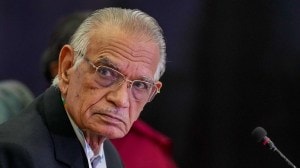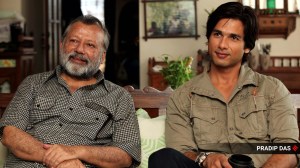Akal Takht punishment to assassination bid, pendulum swings again for Sukhbir Badal
The former Deputy CM has been at the receiving end since Akali Dal lost power, with its electoral decline unchecked since. Could the two developments mean a clean slate for the 62-year-old?
 Shiromani Akali Dal leader Sukhbir Singh Badal at the Golden Temple to serve the 'tankhah' (religious punishment) given to him by the Akal Takht, in Amritsar. (PTI Photo)
Shiromani Akali Dal leader Sukhbir Singh Badal at the Golden Temple to serve the 'tankhah' (religious punishment) given to him by the Akal Takht, in Amritsar. (PTI Photo)From being hailed as an ace campaigner who led the Shiromani Akali Dal (SAD) to a historic win for a second consecutive term in the 2012 Punjab Assembly elections to becoming the target of an assassination attempt while sitting on guard duty at the Golden Temple entrance as part of his religious sentence awarded by the Akal Takht, the pendulum has swung dramatically for Sukhbir Singh Badal, the 62-year-old ex-SAD president.
The shooter, Narain Singh Chaura, a former militant, who went to Pakistan in the 1980s to found the now-defunct Khalistan Liberation Army, has rekindled for many memories of Punjab’s past scarred by days of militancy and its consequences. He is now in police custody, with Sukhbir escaping unhurt.
The shooting incident follows a long period of discontent directed at Badal from different quarters, including a section of the SAD, for various ills plaguing Punjab.
A leading regional party that played a key role in steering Punjab towards peace after the turbulent, militancy-affected 1980s – and in alliance with the BJP beginning 1996 – the SAD has been in decline since its debacle in the 2017 Assembly elections, when the Congress returned to power. The then incumbent SAD won just 15 seats out of 117 as against the Congress’s 77.
It was caused by various factors, including the incidents of sacrilege that rocked the state in 2015, free availability of drugs, galloping unemployment, agrarian crisis and allegations of corruption aimed mostly at Sukhbir Badal, who had been the deputy chief minister in the SAD-BJP government led by his father Parkash Singh Badal.
Since then, Sukhbir has remained in the line of his rivals’ fire. In the 2017 polls, AAP leader and current CM Bhagwant Singh Mann turned his satirical ditty “Kikli Kaleer” mocking Sukhbir and his family into the AAP’s campaign song. The strategy worked, with the then new player AAP emerging as the principal Opposition with 20 seats.
The AAP went on to sweep the state in the 2022 polls, bagging 92 seats as against the Congress’s 18, with the SAD tally plunging to just 3.
Last month, amid the continued decline in its fortunes, the SAD, for the first time in decades, opted out of contesting the four Assembly bypolls.
Following the Akali Dal’s 2022 rout, an internal committee led by Iqbal Singh Jhunda blamed Sukhbir for it, triggering calls within the party for his removal as its president. The crisis escalated in the wake of the 2024 Lok Sabha polls, when the SAD, contesting separately after its 2020 break-up with the BJP, managed to win just one seat out of 13 as against the Congress’s seven and the AAP’s three, with the remaining two seats won by Independent candidates – radical preacher Amritpal Singh from Khadoor Sahib and Sarabjeet Singh Khalsa, son of Indira Gandhi assassin Beant Singh, from Faridkot.
The only seat the Akali Dal could win was Bathinda, Badals’ home turf, from where Harsimrat Kaur, wife of Sukhbir, was elected for the fourth consecutive term. What added insult to the party’s injury was that ten of its candidates ended up losing security deposits.
A month after the Lok Sabha poll results, in July, a group of SAD rebels sent a letter to the Akal Takht, the highest temporal seat of Sikhs, listing what they called were Sukhbir’s “sins”.
The Akal Takht, which has faced allegations of being influenced by the SAD through the party-dominated SGPC (Shiromani Gurdwara Parbandhak Committee), has finally asserted its authority Monday. It declared the SAD to be unfit to govern Punjab and gave various religious punishments to Badal and his erstwhile ministers, some of whom are now part of the rebel SAD faction.
The Akal Takht also directed the SAD to reorganise, starting with a membership drive followed by internal elections. This verdict compels the party, which has remained in disarray, to reconnect with its grassroots supporters. While Sukhbir’s allies hope this offers him a chance to start afresh and rebuild his image, his critics see it as a “superficial fix”. The lingering resentment against him was evident on social media and in public, which manifested violently at the Golden Temple in Amritsar Wednesday.
The incident also revived fears of militancy. The fall of the SAD, which once provided a moderating space for Sikh politics, has coincided with the rise of radicals such as Amritpal Singh, who won the Lok Sabha election despite being in a jail in Assam.
The Akal Takht’s intervention in party affairs is, however, also fraught with risks. Since its Moga Declaration of 1996, the Akali Dal has repositioned itself as a party, moving away from a strictly panthic identity. During its convention at Moga that year, the SAD passed this Declaration in which it called itself a party that stood for “Punjab, Punjabis and Punjabiyat”. This marked an ideological shift for the party which was earlier considered largely panthic or one that took care of the material and spiritual interests of Sikhs not just in Punjab but all over the world.
The SAD fought subsequent polls in alliance with the BJP up to 2019. Sukhbir, in particular, took pride in fielding more Hindu candidates than his rival parties in Punjab.
The Akal Takht’s directives to the SAD to get its house in order has triggered concerns in some circles. A return to a hard panthic agenda could alienate the Akalis’ diverse vote base. However, many also hope that a revival of a democratic process within the SAD could help the party regroup and reclaim its moderate stance.
Sarabjinder Singh, dean of Guru Nanak Dev University, noted that a quick survey conducted after the Akal Takht’s decision revealed “public satisfaction”.
“The humiliation gave people a vent for their frustrations. They may now forgive Badal and the party,” said another observer.
Ashutosh Kumar, a political science professor at Panjab University, said while the Akal Takht’s verdict might start the process of the SAD’s recovery, there would also be a risk of it retreating into a panthic agenda. “Religiosity is permeating every sphere in India, it could happen here too,” he said.
As for Sukhbir, the SAD’s organisational elections would prove whether his party still sees him as fit to lead it.
- 01
- 02
- 03
- 04
- 05































